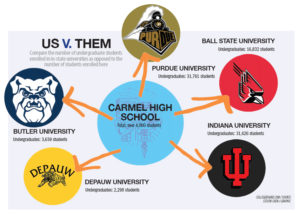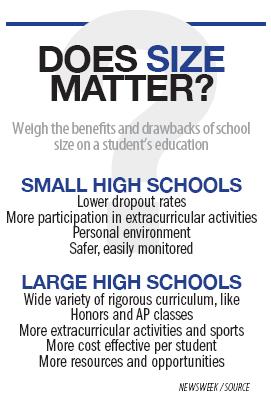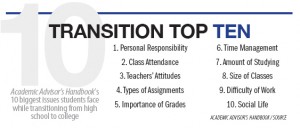By Emma Neukam
<[email protected]>

Walking the hallways filled with over 4,000 other students doesn’t bother senior Molly McKneight who, like about 93 percent of her class, is planning on some form of secondary education after graduating this year.
“With a larger school, I’ve come to know there are more opportunities and more people to meet,” she said.
In fact, McKneight said she’s robably going to attend Purdue University next fall, which had over 10 times more students than this school had last year.
As students like McKneight prepare for college, they are finding out that high school size affects their transition into college as well as the benefits and drawbacks of going to larger or smaller high schools. Vicki Nunery, a College and Career Resource Center coordinator here, said she believes the size of a high school definitely impacts a student’s transition into college. “Some don’t want to go to a small college because they like Carmel High School so much,” Nunery said.
McKneight has based her search for colleges on universities that were at least the size of this school. According to McKneight, when her friends from Guerin Catholic High School visit large colleges, they are intimidated because they are not accustomed to attending larger campuses. Besides helping students become comfortable with larger student populations, Nunery said larger high schools may offer more advanced level courses that may not be available at smaller schools.

However, Johanna Lipp, a sophomore at Indiana University’s Kelley School of Business and a Carmel graduate, said students who attend large high schools only have a small benefit over those who attend small ones. “Obviously you might have a slight advantage by generally knowing how to stand out, do your own thing and excel in big groups,” Lipp said via e-mail, “but the college will most likely be bigger than your high school no matter how big your high school actually was. So it will still take you a bit to transition.”
In some cases, though, McKneight said she accepts that a smaller high school would prepare students better for college. She said the personal environment in a small school would be better for getting to know teachers and classmates.
According to Lipp, knowing how to connect positively with teachers in high school can have a huge payoff in college.
“Positive interactions with your teachers also really help to set you up for success, because those same relationships with your professors become really important in college,” she said. Lipp gave another reason why smaller high schools might ready students better. “I guess with a small high school, you might get the chance to build deeper relationships with the people around you which is very important when you’re away from your family and friends in a new place,” she said.

Nunery said there are many good habits students from schools of all sizes can pick up during high school to make the transition to college easier, like “learning to have good study skills” and “being a student that’s eager to learn.” Ultimately, though, Nunery said students must push themselves to get involved. “There are many opportunities academically and in extracurriculars and it’s up to you to make the most of them,” she said.
By signing up for a wide array of classes, participating in rigorous academic courses and utilizing the College and Career Resource Center, McKneight said students can take advantage of the opportunities present in this school to get ready for college. Lipp agreed and said, “The high academic standards that Carmel has for its students really helped, because I was already used to them once I got to college. As a result, I was one step ahead of a lot of other students.”
Besides academics, Lipp’s advice is for students to involve themselves in extracurricular activities like clubs and sports to learn to manage their time. By running for the cross country team and being president of German Club, she said she learned valuable time management skills, relationship skills and how to interact with others which have helped her at IU.
Still, McKneight said she believes the transition to college would be easier coming from a large high school, especially this one, because of its wide array of opportunities and challenges. “You’re used to competition and having to work hard on your own without having someone there to push you,” she said.
In the end, Lipp said what is most important for college is for students to step out of their comfort zones and challenge themselves during high school, whatever size it may be. She said, “Know what you want to achieve, why you do and how you are going to do it. If you can learn to do that in high school, the transition in terms of size should be a piece of cake.”




























![Keep the New Gloves: Fighter Safety Is Non-Negotiable [opinion]](https://hilite.org/wp-content/uploads/2024/12/ufcglovescolumncover-1200x471.png)















































![Review: “We Live in Time” leaves you wanting more [MUSE]](https://hilite.org/wp-content/uploads/2024/12/IMG_6358.jpg)
![Review: The premise of "Culinary Class Wars" is refreshingly unique and deserving of more attention [MUSE]](https://hilite.org/wp-content/uploads/2024/12/MUSE-class-wars-cover-2.png)
![Introducing: "The Muses Who Stole Christmas," a collection of reviews for you to follow through winter [MUSE]](https://hilite.org/wp-content/uploads/2024/12/winter-muse-4.gif)
![Review: "Meet Me Next Christmas" is a cheesy and predictable watch, but it was worth every minute [MUSE]](https://hilite.org/wp-content/uploads/2024/11/AAAAQVfRG2gwEuLhXTGm3856HuX2MTNs31Ok7fGgIVCoZbyeugVs1F4DZs-DgP0XadTDrnXHlbQo4DerjRXand9H1JKPM06cENmLl2RsINud2DMqIHzpXFS2n4zOkL3dr5m5i0nIVb3Cu3ataT_W2zGeDAJNd_E-1200x884.jpg)
![Review: "Gilmore Girls", the perfect fall show [MUSE]](https://hilite.org/wp-content/uploads/2024/11/gilmore-girls.png)
![Review in Print: Maripaz Villar brings a delightfully unique style to the world of WEBTOON [MUSE]](https://hilite.org/wp-content/uploads/2023/12/maripazcover-1200x960.jpg)
![Review: “The Sword of Kaigen” is a masterpiece [MUSE]](https://hilite.org/wp-content/uploads/2023/11/Screenshot-2023-11-26-201051.png)
![Review: Gateron Oil Kings, great linear switches, okay price [MUSE]](https://hilite.org/wp-content/uploads/2023/11/Screenshot-2023-11-26-200553.png)
![Review: “A Haunting in Venice” is a significant improvement from other Agatha Christie adaptations [MUSE]](https://hilite.org/wp-content/uploads/2023/11/e7ee2938a6d422669771bce6d8088521.jpg)
![Review: A Thanksgiving story from elementary school, still just as interesting [MUSE]](https://hilite.org/wp-content/uploads/2023/11/Screenshot-2023-11-26-195514-987x1200.png)
![Review: "When I Fly Towards You", cute, uplifting youth drama [MUSE]](https://hilite.org/wp-content/uploads/2023/09/When-I-Fly-Towards-You-Chinese-drama.png)
![Postcards from Muse: Hawaii Travel Diary [MUSE]](https://hilite.org/wp-content/uploads/2023/09/My-project-1-1200x1200.jpg)
![Review: "Ladybug & Cat Noir: The Movie," departure from original show [MUSE]](https://hilite.org/wp-content/uploads/2023/09/Ladybug__Cat_Noir_-_The_Movie_poster.jpg)
![Review in Print: "Hidden Love" is the cute, uplifting drama everyone needs [MUSE]](https://hilite.org/wp-content/uploads/2023/09/hiddenlovecover-e1693597208225-1030x1200.png)
![Review in Print: "Heartstopper" is the heartwarming queer romance we all need [MUSE]](https://hilite.org/wp-content/uploads/2023/08/museheartstoppercover-1200x654.png)



